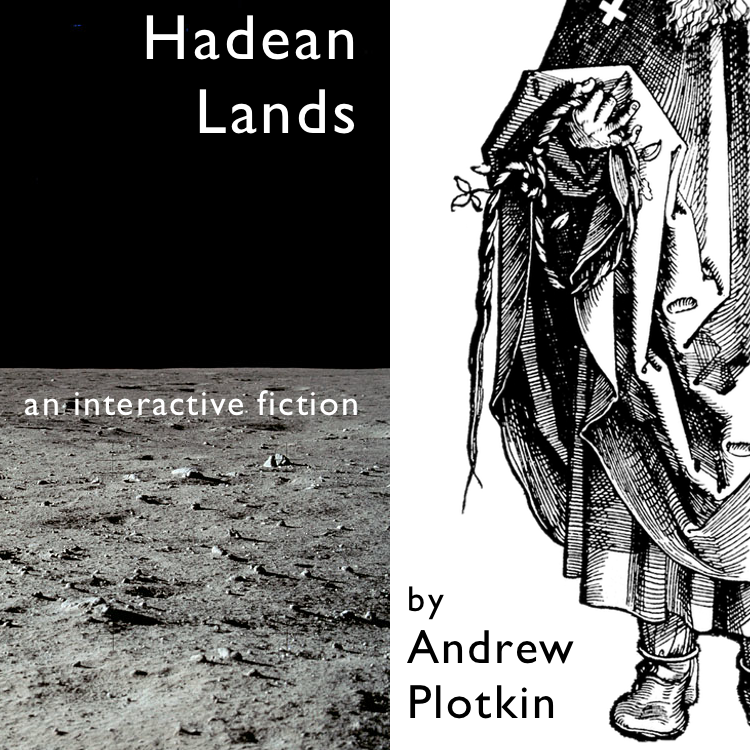You have just read a blog post written by Jason McIntosh.
If you wish, you can visit the rest of the blog, or subscribe to it via RSS. You can also find Jason on Twitter, or send him an email.
Thank you kindly for your time and attention today.

This is a spoiler-free post. Executive summary of the links: An excellent hint book. A fascinating plot discussion.
I have completed my stream of Hadean Lands. It stretches across fourteen weekly episodes which average two hours apiece. To the best of my knowledge, this represents the world’s sole public recording of an end-to-end playthrough of this game. I extend warm gratitude to everyone who accompanied me by kibitzing in each week’s attached chat, and doubly to Andrew Plotkin, who acted as call-in guest for several episodes—and who, of course, wrote the game.
This post collects a few notes and observations about my experiences with the game, as well as links to important related media within the IF ecosystem. (I do have additional thoughts specific to the challenges and rewards of streaming interactive fiction, and shall save them for a future post.)
While not the author’s most accessible work, Hadean Lands stands among the most important digital experiments of the current century. Ritualistically binding itself to the strictures of the text adventure’s ancient format, the game cast itself into bold new territory, both mechanically and stylistically, when Zarf published it in 2014. Anyone interested in the study of interactive narrative would benefit from at least a few hours exploring this game’s strange world. (I suspect that a typical playthrough by an attentive player not trying to put on a show would take significantly less time than my own 28-hour performance.)
Hadean Lands demonstrates so much potential for how a game of information-keyed puzzles can work that I suspect it has already influenced more recent commercial work in the adventure-game space—including, but not limited to, the trend of time-loopy adventures that has appeared in its wake. (I would bet a four-eyed space frog that Outer Wilds is one, even though I wish it could have gone further in copying Hadean’s principle of avoiding player repetition.)
The work also stretches the boundaries of how subtle a video game’s story can afford to get, especially when it doesn’t center the player’s own labors. I stayed up late after wrapping the stream’s final episode reading this long discussion of the game’s plot, and felt abashed to find how many threads of Hadean’s plot I failed to even grasp, let alone unravel, even though I “won”. To some extent, I can pin the blame on the peculiar context of live-streaming, which tends to encourage a bright focus on mechanical action and solution, rather than the more quiet and contemplative play one would need in order to cognitively connect all the game’s disparate clues into a sensible narrative.
I never took the time to consider how the player character’s unusual qualities—their eidetic memory, their affinity for performing rote tasks again and again—might serve not just as a gameplay gimmick but as a narratively significant element of a greater story. Worse, I expressed impatience during the stream whenever I discovered information that didn’t have any clear bearing towards mechanical puzzle solving. “Ugh, more lore,” I’d groan, shutting myself (and my audience) out of half of the game’s pleasure. Truly “winning” Hadean Lands means not just arriving at the end, but having at least some notion of how it all came to pass. Laser-focus on bashing through the puzzles won’t get you there.
In particular, I see the influence of John M. Ford’s treacherously slippery storytelling style in this game. Two years ago I enjoyed both Ford’s The Dragon Waiting and Zarf’s exhaustive concordance of it; I find it unavoidable, in retrospect, to read Hadean Lands as an intentional extension of this tradition.
Not to suggest that the puzzle-solving side of this game is easy, either! On that front I’m happy to report that Dan Fabulich’s brilliant hint book, posted to the web several years after Hadean Lands’s release, makes finishing this game a much more tenable proposition today. I discovered this carefully paced walkthrough in the middle of one of my stream’s episodes, and I feel certain I would have given up on this project without it. Dan wrote this guide in the style of Infocom’s famously gentle and patient “Invisiclues” books, and it fits this game perfectly. Everyone starting out on their own Hadean Lands journey should bookmark Dan’s post.
When written properly, an Invisiclues-style guide gives players plenty of chances to still feel like they solved every puzzle they needed hinting for. It offers nudges and observations and suggestions, not just hand-grasping walkthroughs. I turned to Dan’s guide every time I simply had no idea where to look next, especially after I’d uncovered most of the map. In many cases, a hint of “Have you visited such-and-such lately? Make sure you carefully examine everything there” was enough to unjam my attention and allow me and the chat participants to solve the subsequent thirty-seven steps of the current conundrum ourselves.
Finally: I still don’t know how to pronounce Ensign Sydney Ctesc’s name. During the stream I fumblingly went with [See-tesk], obviously incorrect by any measure. My usual go-to website for pronouncing diverse coworkers’ names offered no help, nor did Wikipedia, so I presume it’s a made-up amalgamation of other names. A near-analogue I did find suggests I could have hit the mark closer with something like [Tzesk]. Sydney, my man, you kind of suck, and I hope you got what’s coming to you, but you didn’t deserve me mangling your name so badly over the aither.
To share a response that links to this page from somewhere else on the web, paste its URL here.